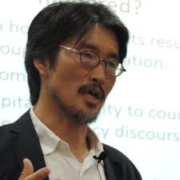Kang Zhao
Competency-based education in China
Today I talk with Kang Zhao about how Chinese policy has interpreted and implemented notions of competency-based education, which has been advanced in global organizations such as the OECD. Kang sees core competencies as limiting and calls for an education beyond competencies.
Kang Zhao is an associate professor in the College of Education at Zhejiang University. He’s latest article published in the ECNU Review of Education is entitled Education for Wholeness, but beyond competences: Challenges to key-competences-based education in China.
Citation: Zhao, Kang, interview with Will Brehm, FreshEd, 223, podcast audio, November 30, 2020. https://freshedpodcast.com/zhao/
Will Brehm 1:51
Kang Zhao, welcome to FreshEd.
Kang Zhao 1:53
Thanks, Will. And thanks for your invitation for this special interview.
Will Brehm 1:58
It is really wonderful to have you. And so, I want to talk today about this idea of competency-based education. How is this notion of competency-based education a global circulating policy?
Kang Zhao 2:12
Well, the idea of key competence was actually mainly developed and elaborated by the OECD, you know, the Organization for Economic Co-operation and Development, and also other international organization like the European Union, the UNESCO. And actually, not simply these international organizations but also many countries around the world in the past 20 years. And surely, in recent years in China, we also began to … there is such kind of a strong tendency happening here in China.
Will Brehm 2:49
So, it seems like many different organizations and many different countries are advancing this notion of key competencies, or competence-based education. And another idea that comes up that’s sort of connected to key competencies are 21st-century skills. So, what are so-called 21st-century skills? And how do they connect to key competencies?
Kang Zhao 3:14
Well, it’s good questions. And the reason why we advance this big idea is that these organizations are trying to make sure that such kind of ideas will secure a kind of successful life of children and young people and also secure a kind of so-called well-functioning society. So, the OECD assumes that the young person should develop some kind of competencies, which are necessary in the 21st century. So, the background is that there are quite a lot of great changings occur in the last few decades. For example, what we call a knowledge economy, digital technology, international corporations, these things happened just in the last few decades. So, the consequence is that they think to educate the young generation to adjust to these global changings important. So, competences become a new slogan, or we can say, a new mantra of education in our age. So, these ideas is actually advocated at the very beginning for economic agenda because it is related to human capital and the job market of some areas. And also, some countries for economic competition and at a global level.
Will Brehm 4:45
It makes sense with the OECD being the organization advancing the idea that it would be about economic growth and human capital development. That seems to be the way in which they view the purpose of education, after all.
Kang Zhao 4:58
Yeah, you know, the ups and downs of economic growth in one area directly influences its political agenda also. And competence-based education in this sense is kind of instrumental view of education. As you mentioned just now, OECD is specifically about the 21st century skills. Actually, there are quite a lot of different versions about the answers if I tried to speak about that. And originally, they are key skills for today’s students, I mean, suggested by those organizations. For example, in UNESCO, there is an organization called the Center for Universal Learning, they actually put forward the kind of 21st century skills that international students should have. And they developed in the last few years, in 2013. And then the ideas began to develop. So, basically, now 21st century skills are key abilities for students to be successful in their careers during the information age, or which we can also call the internet age. So, it’s basically due to rapid change in our society and the technology. Specifically, these ideas or the definition or the concepts of the skills include three areas. The first is about the learning skills, including communication, collaboration, creativity and innovation, and critical thinking including problem-solving. So, these are usually called “The Four C.” There are also literacy skills, including information technology and media. And thirdly, there are also life skills, which include flexibility, leadership, initiative, productivity, and social skills. So, all of these together constitute into the 21st skills for students.
Will Brehm 7:02
It is an interesting overview of this sort of global idea that’s found in some of these global institutions. So, the question is, how did this competence-based education sort of, you know, land or come about in China? How would you even begin to define the concept of competence in the Chinese context?
Kang Zhao 7:26
Yeah, it’s interesting. It’s a good question also, I think. Because every foreign idea coming to a local area, there must be some story behind it. So, in China, the concept of competence is generally formulated as a Chinese word called “suyang” as a kind of alternative name for competence. But the problem is that this Chinese term is not exactly the same idea of competence, because it means in Chinese, the level of knowledge and morality, or kind of attitudes, even. Not exactly about ability to do something. So, from this perspective, there are indeed some translation issues over there. But interestingly, many scholars have realized this problem, and we are trying to find a more accurate expression to it now.
Will Brehm 8:23
So, in the idea of suyang in China, what sort of isn’t included in suyang? What competencies aren’t in suyang?
Kang Zhao 8:31
Yeah. Because suyang is a Chinese term, it actually cannot be equated with competence. It seems that Core-Suyang is including everything when you look at the definition of this term. It has been beyond the limits of its original meanings, covering so many cultural, self, and societal elements. So, the problem is that it does not define what non-Core-Suyang are about, which means the Core- Suyang can continue to be enlarged. So, this is the problem of this definition again, to me.
Will Brehm 9:06
So basically, Core-Suyang can mean pretty much anything that’s taught in schools and in education.
Kang Zhao 9:13
Yeah. At least, nowadays, they put so many thing in the concept of suyang.
Will Brehm 9:19
Such as? I mean, you said it is about knowledge and morality and attitude. But does it mean more than that?
Kang Zhao 9:25
They actually put many different thing into it, including cultural, moral, knowledge, skills, attitudes, values, abilities. All kinds of things in this whole framework.
Will Brehm 9:38
Is there a longer history of competency-based education in China?
Kang Zhao 9:43
No, it’s not quite long. It’s only six years. It was introduced in 2014, and it appeared in an official document in Chinese government. So, it’s not quite long.
Will Brehm 9:57
And what about suyang? What’s the longer history of suyang because, obviously, that existed long before competency-based education?
Kang Zhao 10:06
Yeah, the word of suyang is actually not used in the formal education. It was only a Chinese character used in our daily life to describe some people who are good at some areas of knowledge or skills or their kind of ability. So, it’s not, at the very beginning, not used in education.
Will Brehm 10:30
So, in China, isn’t there an idea about the “all-around developed person”?
Kang Zhao 10:35
Yes. The all-around developed person is an idea in formal education. It is actually have a long history. At least from 1949 since the establishment of a People’s Republic of China. And it was actually developed by generations of communist parties. They tried to keep it as a long-standing policy in their educational ideal.
Will Brehm 10:59
And what does it mean more or less?
Kang Zhao 11:00
At the beginning, the all-around person means to educating for the people who is good at their health, and their intellectual ability, and their morality. They would call it the three dimensions of education: morality, intellectual, and physical education. But gradually, it now has developed into five dimensions. There is also called labor education and aesthetic education. So, we have five dimensions of education in defining the all-around developed person.
Will Brehm 11:37
And are these five dimensions of the all-around developed person, are they connected in any way to the idea that of suyang?
Kang Zhao 11:45
Yes, yes. And that is exactly the problem now I’m trying to clarify in my article. As I have said in the article, the idea of all-around developed person has been a long-standing educational policy in China. In 2014, China’s Minister of Education embarked on a new round of curriculum reform based on the government documents just published in 2014. In that document, the concept of key competence was officially mentioned. And exactly in this document, they say that the starting point of a current curriculum reform is mainly to realize the educational task of building moral character and cultivating humanity. This is a guiding principle of the central government’s educational policy. But interestingly, in this document, a particular claim that educating the young to be the all-around person is the center of this reform, or we can call it the pivot of this reform. So, you can see they put the all-around development person and the competence-based education together. And just two years later, in 2016, the government support a project, which was launched by the Beijing Normal University; they finally produced a framework called the general framework of key competence of students at a stages of basic education and the higher education. So, this framework was just issued after two years of that document. So, from this framework, we can see the idea of the all-around developed person was put at the very center of this framework.
Will Brehm 13:36
Right! It’s quite interesting to think about that, you know, the all-around developed person has been an idea, guiding education in China for many years, many decades. And this new idea of competency-based education sort of appeared more recently and has dovetailed and merged together with the all-around developed person, which it now almost sounds like it means everything. Like it means so many different things between the competency-based education, the all-around developed person, and these notions of suyang in China. So, I guess, you know, with this very, very expansive meaning of the idea of competencies now, what does that actually mean for students and teachers? I mean, it’s one thing to be at the policy level, but what does it actually mean for students and teachers?
Kang Zhao 14:25
It’s a good question. When core competencies are transformed into concrete curriculum, they become disciplinary core competencies in China, or we call that core competence based on subject. So, it’s quite a special, I think. This is kind of a seminal design, I think, in China. When this happen, there become a long list of specific tasks to be performed by teachers. But what does this mean that teachers have very limited space and opportunities to conduct their professional freedom or professional agency because they have to follow the list to perform their task. So, what they need to do is just to follow the list to conduct their teaching without using their professional judgment. And at least they have to finish their teaching objective that was adopted by, for example, by the headteachers or the headmaster.
Will Brehm 15:27
It must be frustrating in a way for teachers.
Kang Zhao 15:30
Yeah, quite frustrating for teachers. And of course, there is quite a lot of heavy burden for them because long lists of tasks have to be done.
Will Brehm 15:39
More things to teach in the same amount of time.
Kang Zhao 15:41
Yeah, and they have to follow specific kinds of rules to do that. And also, for the students, there is also a problem there because the core competencies are also defined in terms of the predefined learning outcomes for tests based on each subject. This means for students; they will have to pay their attention to particular kind of subject competencies, you know, rather than pay attention to something unexpected learning outcome.
Will Brehm 16:12
Right, right. So, all of a sudden, the students are studying these particular competencies and this wide-ranging amount of competencies because they’re going to be tested on it.
Kang Zhao 16:22
Yeah, there will be kind of a standard for their learning outcomes. And also, this lacks opportunity to integrate different competencies to solve the problem in students’ lives because they just focus on different subjects. So, that’s why I mentioned in the article; there is a kind of a lacking integrate all these competencies into an organic and holistic, something like that, for students to resolve their problems in their lives.
Will Brehm 16:53
Yeah. It sort of begins to beg the question about, you know, should this idea of the all-around developed person, which has had a long history in China: should it even be understood using this notion of core competencies? It seems as if the core competencies have, in a sense, reduced the meaning of all-around developed person into particular standardized ideas that can be assessed and perhaps missing out on other aspects of what it would mean to be an all-around developed person?
Kang Zhao 17:27
Yes, it’s a good question. There indeed is something missing, I think, in terms of the subject of core competencies. This first has something to do with the notion of all-around developed person. In my view, the idea of an all-around developed person always say, the whole person should not be understood just using the core competency to explain it, particularly by using subject core competencies. Because first of all, the concept of core competence only stands for, as you can see from the beginning of our conversation, it stands for a particular kind of conception of a broader whole person being in an age of information or age of internet. I mean, it’s kind of a particular historical period of time to meet those needs of the current time, and then we produce this kind of competencies. So, it’s quite limited to use these competencies to explain what the whole person mean. And also, from the conceptual level, we can see the idea of the whole person, to me, is an open question and should be continued to work on. And it is much more suitable to define the whole person not by using a list of specific competencies. And also, from the practical level, you can see to integrate the separate competencies into a holistic and organic whole is extremely important to educate the whole person. But the subject of core competence only focuses on competence and a particular subject. So, this is a problem there, I think.
Will Brehm 19:02
What are some things missing?
Kang Zhao 19:04
The most important thing for me also, probably, what is missing is that we can see from an existential sense, which means that what Biesta called subjectification meaning that individual students desire to exist in and with the world in and grow up way means being a subject. But the competence only offers some particular knowledge, competencies, attitudes, or skills, which can all be seen as kind of things to give students in order to make them more competitive, more agentic to perform some kind of jobs or tasks. So, this is different from what Biesta called the subjectification. What he was trying to clarify is that we need to help students or help children to be in and with the world in a kind of non-ecological way, which is about our relationship with the world. And this needs to focus on the relationship rather than some kind of specific competencies or skills. So, that is what is missing in my understanding in the whole concept of key competencies.
Will Brehm 20:16
It’s such a fascinating story of this idea of competencies coming into China and sort of merging with this longer idea of all-around developed person. And as you have rightly pointed out, there’s some serious problems with this long list of specific competencies that should be attained and measured for students or on students. And it sort of misses all these other ideas of education and perhaps other ideas that were meant in all-around developed person. And so, the question I have is, why would Chinese government so fully embrace this global idea of core competencies in education policy?
Kang Zhao 20:58
The reason why the Chinese government adopts this kind of international concept of the core competencies is that I think, has something to do with the economic competition at a global level. This conception is very related to the human capital and economic competition. So, I think the government realized it is important to bring this kind of conception as an educational endeavor to improve student’s ability to deal with the modern issues they face. And in the meanwhile, to improve their job market ability -to find their job and also improve the national economic growth. So, all these things that I think has something to do with China’s role in the global stage. They don’t want to be left behind. They want to be in this kind of competition.
Will Brehm 21:55
Yeah. And perhaps even be the leader at the global level. I mean, China is, you know, such a powerhouse in terms of its economic growth and power and support for global capitalism that you could almost point to China as being the leader in perhaps core competencies globally now in many ways. I mean, I guess there is a comparative study to be had. So, I guess the final question, then, is the challenges or some of the critiques that you’ve raised by doing a close analysis of different policy documents and thinking through the history of core competencies in China and at the global level, do you imagine that Chinese policymakers will actually address some of the challenges that you raise? Or do you imagine that they’re going to continue really supporting and advancing the global idea of key competencies?
Kang Zhao 22:50
Yeah. Recently, I think many scholars and experts realized some problem or some issues I mentioned in the article. For example, about the term used as suyang to stand for competence. We’ve realized it is a problem and began to actually think in different expression to it. This is one thing. And also, they began to integrate different kind of competencies into a more holistic configuration of the curriculum design. That is what they are trying to do now. So, more scholars and more educators trying to localize the competence in China. They also refer to the different versions of competence in different countries in order to make it more suitable for Chinese students. But in the meanwhile, to draw many good things from other countries to improve it, or to make it better suitable for the Chinese contexts. So, I think this is a good thing for our country’s scholars and the teachers. Yeah. And, to me, so educators and the teachers needs to maybe ask something unexpected, or even the impossible from students. Rather than simply focusing on a list of predefined competencies for current social needs. I mean, for students, we never know what they will show to us. We need to keep open to bring these things out from students, rather than we just put a lot of competence on them. So, that’s my reflection for what education beyond competence looks like?
Will Brehm 24:30
Right, right.
Kang Zhao 24:31
You probably want to ask me, what do you mean by education beyond competencies?
Will Brehm 24:36
Yeah.
Kang Zhao 24:37
Yeah. If you ask me this question to me, I have no standard answers. Obviously, education beyond the competence means to keep what we mean to be human, or what we mean to be a whole person?
Will Brehm 24:52
It’s such a fascinating idea. And I think there is a lot of work and research that will go into the idea of education beyond competencies, and I would just like to extend a warm welcome back to FreshEd anytime you have more research to talk about such an idea. Kang Zhao, thank you so much for joining FreshEd. It was really a pleasure to talk today.
Kang Zhao 25:12
Thank you very much, Will. I really enjoyed talking with you.
Want to help translate this show? Please contact info@freshedpodcast.com
Related Publications by Guest
Mentioned Resources
UNESCO list of 21st century skills
OECD transformative competencies for 2030
Related Resources
Education in China: A snapshot
China’s education, curriculum knowledge and cultural inscriptions: Dancing with the wind
Competence for students’ future: Curriculum change and policy redesign in China
Social changes and Yuwen education in post-mao China: Control, conformity and contradiction
Curriculum reform and ‘quality education’ in China: An overview
Subjectification and education for quality in China
Human capital and rates of return: Brilliant ideas or ideological dead ends?
* Check this article’s reference list for links to official government documents on curriculum reform
Multimedia resources
Competencies for teaching in multicultural classrooms
Competency-based education vs. traditional education
Have any useful resources related to this show? Please send them to info@freshedpodcast.com









